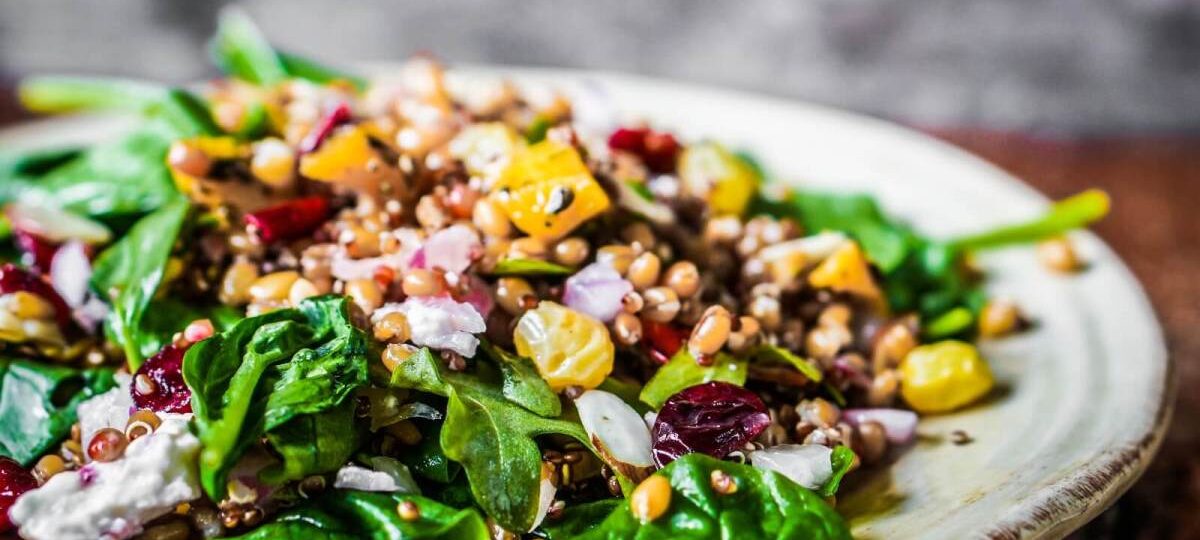Our bodies need a variety of nutrients to function and thrive. Here’s how spinach can help us get them…
Spinach is a plant-based source of iron, vitamin C, and vitamin A, among others Credit: Adobe. Do not use without permission.
Spinach is a leafy green veg (along with kale and cavolo nero) and a member of the Brassica family. It is incredibly versatile and can be enjoyed raw in a salad or smoothie, cooked and served on the side or as part of another dish. Check out these recipes for inspiration: spinach and white bean soup and spinach fritters.
In the UK, spinach is in season from April through to October, which gives it a thumbs up on the sustainability front. And if that wasn’t enough to convince you to add some into your next shop, it also ranks highly on the nutrition front as I’ll explore in this article.
How good is spinach for you?
This is a difficult question to answer as all vegetables are ‘good for you’. As a nutritionist I’d recommend including a variety of veg within your diet as different vegetables contain different nutrient profiles including vitamins, minerals, fiber, antioxidants (substances that can prevent or slow damage to cells caused by free radicals) and phytochemicals. All of these nutrients support our body in a positive way.
Spinach contains a wide range of nutrients including vitamins A, C and K, as well as folate (vitamin B9), manganese, zinc, magnesium, iron, calcium, potassium, and fiber (1). Spinach also contains a range of antioxidants and phytochemicals that can help to reduce oxidative stress and may benefit your eye health and reduce blood pressure (1). Let’s have a closer look at the impact some of these nutrients have on our health.
Vitamin A (beta-carotene)
Vitamin A promotes healthy skin and vision and supports our immune system to function (1,2). In plant-based foods, vitamin A occurs as provitamin A carotenoids. In addition to being a dietary precursor to vitamin A, these carotenoids are also fat-soluble antioxidants (1). In spinach these compounds include lutein and zeaxanthin and are associated with a decreased risk of age-related macular degeneration and cataracts (1,3,4).
Vitamin C
Vitamin C aids the growth of healthy connective tissue and supports wound healing. As this vitamin can’t be stored within your body it is important to consume foods containing vitamin C on a daily basis (5). If you were to add 80g of raw spinach to your salad or smoothie, this would provide around 50 percent of your daily vitamin C requirements.
Vitamin K
Vitamin K is found in all of the leafy greens and is important for wound healing through its role in blood clotting and it may also support our bone health (6).
Folate (vitamin B9)
Research has found that this nutrient helps to prevent neural tube defects in the first trimester of pregnancy. This is why women in the UK are advised to take a folic acid supplement in the preconception phase and for the first 12 weeks of pregnancy (7).
However, folate is also important at other stages in life. If you don’t consume enough of it, you can experience a type of anaemia which can leave you feeling tired and lacking in energy (8).
Iron
For those old enough to remember Popeye, he was never without his spinach due to the energy it gave him! Spinach is a good source of this mineral which plays a key role in enabling our red blood cells to transport oxygen around the body while also supporting energy production and DNA synthesis.
One consideration with spinach however is that it naturally contains high levels of a compound called oxalic acid which can inhibit the absorption of minerals like iron. This can be avoided by lightly cooking or wilting it (9).
Also worth noting is that those with a history of oxalate-containing kidney stones should minimize their consumption of spinach and other veg containing high levels of oxalic acid (9).
Fiber
In the UK, we’re advised to eat 30g of fiber per day and around 60 percent of us aren’t hitting this target (10). Ensuring we have enough fiber in our diets is key as it plays several important roles in our body including supporting our digestive and immune health and reducing inflammation (which can lead to chronic disease such as heart disease and type 2 diabetes) (10).
While it is likely that those following a plant-based diet are consuming adequate levels of fiber in their regular diet, what our body also needs is diversity in our fiber sources. This is because different bacterial species naturally living in our gut microbiomes use different plant-based fibers for energy and growth (11). All plant-based foods contain fiber so ensuring you are eating a diverse diet means you are likely to have a diverse microbiota which has been linked to improved health outcomes (11).
Original Article: Rebecca Stevens, Plant Based News










